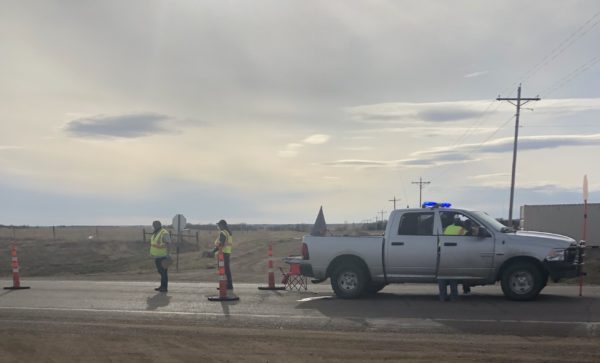
- Details
- By Native News Online Staff
WASHINGTON — The Trump administration on Tuesday filed a response to the lawsuit filed on June 25, 2020 by the Cheyenne River Sioux Tribe (Tribe) against President Donald Trump and 10 other members of his administration, including Mark Meadows, the White House chief of staff; David Bernhardt, secretary of the Interior; Tara MacLean Sweeney, assistant secretary-Indian Affairs, Department of the Interior; and Dr. Deborah Birx, White House coronavirus response coordinator.
At issue are the checkpoints the tribe installed in late March at various points along U.S. Route 212 and South Dakota Highway 63 to prevent travel in and out of the Cheyenne River Indian Reservation, home to 10,000 tribal citizens, to prevent the spread of COVID-19.
Since the installation of the checkpoints, the tribe has been in a showdown with South Dakota Gov. Kristi Noem who demanded the checkpoints be removed. When the Tribe did not comply with her demand, Noem asked the White House to intervene to force the checkpoints’ removal.
The lawsuit alleges the Trump administration abused federal authority to force the tribe to dismantle the checkpoints. Specifically, the complaint alleges Sweeney violated the Indian Self-Determination and Education Assistance Act when she threatened an imminent law enforcement takeover in a June 10 letter.
The Justice Department’s response says in a July letter Sweeney clarified the Bureau of Indian Affairs’ (BIA) position that neither a takeover nor checkpoint was imminent. The letter merely laid out steps the tribe had to take in order to avoid further action by the BIA at a future date.
"At best, plaintiff challenges an entirely hypothetical possibility of a future reassumption action that has not yet occurred, and may never occur,” the Justice Dept. responded.
Additionally, the Justice Dept. responded that President Donald Trump should be dismissed from the lawsuit because the complaint is "entirely devoid of any allegation of harm claimed to be attributable to the president's conduct."
Nikki Ducheneaux of Big Fire Law & Policy Group LLP, which represents the tribe, says "the United States has pivoted and shifted its demands repeatedly throughout this controversy — sometimes from one day to the next."
"As a consequence, the Cheyenne River Sioux Tribe has found it difficult to rely on anything they say. The government's current claim is that its prior threats of imminent enforcement against the tribe are merely hypothetical. The tribe has yet to fully assess this information in the context of this lawsuit but looks forward to both briefing it and discussing it with the United States,” Ducheneaux said.
In addition to Ducheneaux, the tribe is represented by Big Fire Law & Policy Group LLP attorneys Nicole E. Ducheneaux, Rose M. Weckenmann, Judith A. Shapiro and Calandra S. McCool.
The Trump administration is represented by Kathryn C. Davis, an attorney with the Dept. of Justice.
As of today, the checkpoints remain in place at the borders of the reservation where as of Tuesday, Sept. 8, there are 33 active COVID-19 cases, according to the tribe’s coronavirus update webpage. Since reporting began, there have been 151 positive COVID-19 cases. Of that number, 117 have recovered and there has been one death.
More Stories Like This
50 Years of Self-Determination: How a Landmark Act Empowered Tribal Sovereignty and Transformed Federal-Tribal RelationsTunica-Biloxi Chairman Pierite Elected President as Tribal Nations Unite Behind New Economic Alliance
NCAI, NARF Host Session on Proposed Limits to Federal Water Protections
“Our Sovereignty Is Not Optional”: Tulalip Responds to ICE Actions
Denied Trip to Alcatraz, Leonard Peltier Tells Sunrise Gathering: “My Heart Is Full”
Help us defend tribal sovereignty.
At Native News Online, our mission is rooted in telling the stories that strengthen sovereignty and uplift Indigenous voices — not just at year’s end, but every single day.
Because of your generosity last year, we were able to keep our reporters on the ground in tribal communities, at national gatherings and in the halls of Congress — covering the issues that matter most to Indian Country: sovereignty, culture, education, health and economic opportunity.
That support sustained us through a tough year in 2025. Now, as we look to the year ahead, we need your help right now to ensure warrior journalism remains strong — reporting that defends tribal sovereignty, amplifies Native truth, and holds power accountable.
 The stakes couldn't be higher. Your support keeps Native voices heard, Native stories told and Native sovereignty defended.
The stakes couldn't be higher. Your support keeps Native voices heard, Native stories told and Native sovereignty defended.
Stand with Warrior Journalism today.
Levi Rickert (Potawatomi), Editor & Publisher

